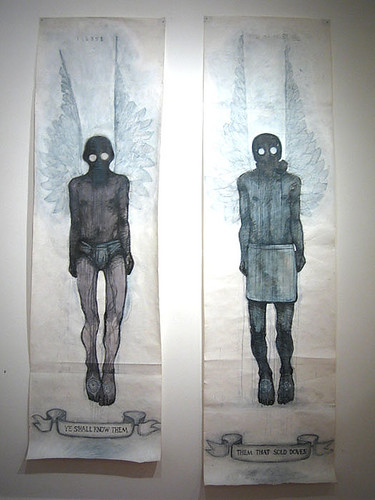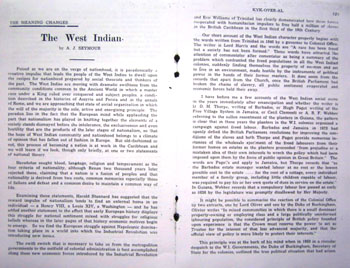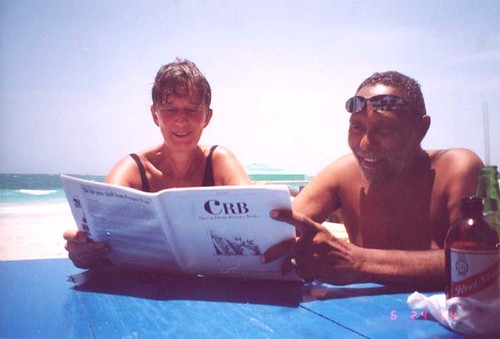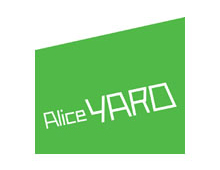Nikolai Noel: Angels at Attention
Angels at Attention: Ye Shall Know Them, Them that Sold Doves, by the Trinidadian artist Nikolai Noel; from the solo show Forgiveness. "The purpose of my work is to question the way we structure our civilisation," Noel says, and in these paintings and drawings he playfully borrows the iconography of traditional Christianity in order to ask awkward questions about the relations between organised religion, the colonial project, and the Caribbean's post-colonial dilemmas. Forgiveness opened at the InterAmericas Gallery, CCA7, on 17 April and runs until 11 May, 2007.
Dear readers: For our sixth anniversary in May 2010, The Caribbean Review of Books has launched a new website at www.caribbeanreviewofbooks.com. Antilles has now moved to www.caribbeanreviewofbooks.com/antilles — please update your bookmarks and RSS feed. If you link to Antilles from your own blog or website, please update that too!
Saturday, 5 May 2007
News: Markham long-listed for O'Connor Award
The news has (somewhat belatedly) reached us here at the CRB that E.A. Markham's latest book, At Home with Miss Vanesa, has been long-listed for the 2007 Frank O'Connor International Short Story Award. The four-book shortlist will be announced in July, the final award in September. Meanwhile, At Home with Miss Vanesa is reviewed by Keith Jardim in the May 2007 CRB.
Posted by
Nicholas Laughlin
at
3:10 pm
0
comments
![]()
Friday, 4 May 2007
Dream books
In the May 2007 CRB, Brendan de Caires ends his review of Derek Walcott's Selected Poems and Edward Baugh's Derek Walcott with this daydream of a complete edition of Walcott's works, literary and artistic:
The large-format editions of The Bounty and Tiepolo's Hound suggest that a brave publisher really should consider a stately, plump compendium of Walcott's poems and paintings, perhaps even an accompanying volume of Collected Plays. This probably won't happen in my lifetime, but I'd like to think it could.
This got me thinking about my own "dream books"--volumes that I wish some intrepid (and deep-pocketed) publisher would take on. For instance, the Walcott book I'd really like to own would be a collection of the book, art, and theatre reviews he wrote for the Trinidad Guardian in the 1960s and 70s. The selection of his essays published under the title What the Twilight Says in 1998 completely omits these, focusing instead on pieces from the "international" phase of his career. Perhaps Walcott considers those Guardian pieces apprentice work, but they're nonetheless important documents not just of the evolution of his own artistic sensibility, but also of a crucial period in post-Independence West Indian culture. In the late 70s Victor Questel compiled a bibliography of these reviews ("Walcott's Hack's Hired Prose"), and I could go to a library armed with that and dig them up for private reading--but I'd much rather that they were in print in an accessible, annotated edition.
And what about V.S. Naipaul's book reviews, the ones he wrote for various British newspapers and magazines in the 1960s and 70s? A couple of these--including his review of C.L.R. James's Beyond a Boundary--appeared in The Overcrowded Barracoon, but, like Walcott, Naipaul seems to consider these pieces "hack's" prose, and they've all but disappeared from the record of his writing career. ("Cricket", that review of Beyond a Boundary, has disappeared too--it doesn't turn up in either The Writer and the World or Literary Occasions, the two collections of his essays currently in print.)
Here are some more of my Caribbean "dream books":
- A complete edition of James's correspondence, which I imagine would run to many volumes. Not only was he apparently interested in everything, but by all accounts James was a prolific letter-writer, with hundreds of correspondents. His letters to Constance Webb have been published under the title Special Delivery, and a few other letters have appeared in various collections of his writings, but the immense task of tracking down the greater part of his correspondence (before it disappears) remains to be begun. --Ditto Samuel Selvon's letters....
- A.J. Seymour's collected prose. He's remembered now for his poems and his editorship of Kyk-over-Al, but Seymour also wrote many important--I might even say groundbreaking--critical essays on West Indian literature, which he collected in various self-published books, and several volumes of memoirs. Needless to say, it's all out of print. I've read some of this material--but not nearly enough--in libraries and archives. It's high time someone assembled the best of Seymour's prose into a neat volume, and reprinted his Collected Poems at the same time.
- Speaking of Kyk-over-Al--why not a facsimile edition of the entire first series of this landmark journal, the 28 issues that appeared from 1945 to 1961? Same for Frank Collymore's Bim.
Opening pages of "The West Indian", an essay by A.J. Seymour in Kyk-over-Al vol. 3, no. 12, 1951
- And what about a series of uniform-format, modestly-sized books on the major Independence-era artists of the Anglophone Caribbean, offering concise biographies and a generous selection of full-colour reproductions? Art books along these lines are the staples of museum bookshops around the world, except here in the Caribbean, where it can be frustratingly difficult to see the major works even of important figures like Karl Broodhagen, Edna Manley, Sybil Atteck, Carlisle Chang, Kapo, Philip Moore.
My list could go on and on. Anthony McNeill's collected poems. An annotated critical edition of Kamau Brathwaite's Contradictory Omens. Wilson Harris's early poems. A Caribbean Voices anthology collecting some of the stories, poems, and reviews originally broadcast on the pioneering BBC Caribbean Service programme....
What about you, dear readers? What are the "dream books" you'd like to have on your own bookshelves? Leave your lists in the comments below, and maybe some enterprising publisher will come across them and make a few dreams into realities.
Posted by
Nicholas Laughlin
at
4:18 pm
1 comments
![]()
Caribbean lit links roundup
• The Literary Saloon posts a link to a review of Havana Blue, by the Cuban writer Leonardo Padura.
• John Mair reports in the Stabroek News on the publication of Guyanese Achievers UK, by Vidur Dindayal, a "who's who" of "the Guyanese mafia" in Britain.
• In the Trinidad and Tobago Newsday, Andre Bagoo looks back at V.S. Naipaul's classic travel narrative The Middle Passage.
• The May 2007 issue of Words Without Borders publishes "Boarding Home", an excerpt from the novel Casa de los náufragos by the Cuban writer Guillermo Rosales (trans. Anna Kushner).
• At the Poetry Foundation blog, Kwame Dawes reports on the finals of Poetry Out Loud. Meanwhile, the Toronto Sun runs a profile of Dawes, in which the poet (and now novelist) reveals that he nearly gave up writing as a university student:
"I took my poems and writings to a teacher at UWI named Wayne Brown," said Dawes, who now teaches English Literature at the University of South Carolina. "He offered a course in creative writing that I wanted to take and he said he had to see my portfolio first. A few weeks later he said I should burn all my writings. And he wasn't joking; he was adamant that I shouldn't write. So I gave up writing."
Posted by
Nicholas Laughlin
at
4:10 pm
0
comments
![]()
"Every subsequent writer on Guiana has stolen more or less of the subject matter"
Since 1846, the Hakluyt Society, based in London, has undertaken the publication of "scholarly editions of primary sources on the 'Voyages and Travels' undertaken by individuals from many parts of the globe. These include early accounts dealing with the geography, ethnology and natural history of the regions visited." (Read more about the history of the Society here.) These editions are celebrated for their scrupulous research and attention to detail, and they range from accounts of famous (or infamous) explorers like Columbus, Drake, Hudson, and Ibn Battuta, to relatively obscure texts like The Arctic Whaling Journals of William Scoresby the Younger.
Their three most recent volumes, as it happens, will be of immediate interest to some Caribbean readers. Volume 15 of the Hakluyt Society's Third Series is a new edition of Walter Ralegh's Discoverie of Guiana, edited by Joyce Lorimer (an earlier edition of the Discoverie was one of the first volumes to be published by the Society in the nineteenth century). And volumes 16 and 17, edited by Peter Riviere, contain The Guiana Travels of Robert Schomburgk, 1835-1844, a series of texts, long out of print, which are among the most important primary documents of Guyana's early history.
By coincidence, the current issue of the Guyana Review reprints some material from Travels in British Guiana, 1840-44 (1847) by Richard Schomburgk (Robert's brother, who accompanied him on his later expeditions): the original author's preface, as well as an introduction by Walter Roth, who made the first translation of the book in 1920. An excerpt from Roth's introduction:
Some thirty years ago, when strolling along the ponds in the Queensland Botanic Gardens, Brisbane, I gazed in wonder and awe at the lovely Victoria Regia lilies which just happened to be in bloom: I never dreamed in those days that I should live to visit their native home in the reaches of the upper Rupununi River. It was the first occasion that gave me the name of Schomburgk, their discoverer, which thus fixed itself upon my memory for all time.
Twenty years later, whilst annotating the literature bearing on Guianese Ethnography, I had the pleasure of perusing in the original, Richard Schomburgk's Travels, and was at a loss to understand how much a monumental, so interesting, and valuable a work, had become forgotten as it were, and had never been "done into English", since it deserves to rank with the highest works on South America travel and adventure.
On the other hand I regret to admit that almost every subsequent writer on Guiana has stolen more or less of the subject matter without acknowledgement....
Posted by
Nicholas Laughlin
at
12:32 pm
2
comments
![]()
"A deep, almost visceral love..."
It is as difficult to generalise about an anthology of Caribbean poetry as it is about the region itself, for as we know, this archipelago of islands and mainland territories is immensely varied and never predictable. And this is the case, too, with this collection, which displays a vast range of voices, moods and techniques. But if one recurring theme seems to run through the works, it is probably a deep, almost visceral love for the landscapes of the Caribbean, a fierce and nostalgic longing for the place which many regard as home.
-- James Ferguson, writing about The Oxford Book of Caribbean Verse in the May/June 2007 issue of Caribbean Beat. (Read Nicholas Laughlin's review of the OBCV in the November 2005 CRB.)
Posted by
Nicholas Laughlin
at
12:24 am
0
comments
![]()
Take the CRB reader survey
The CRB is currently doing a reader survey, to find out more about who reads the magazine and how, what our readers like and don't like, and what we can do to improve it. Whether you're a subscriber, or you borrow someone else's copy, or you read the magazine online, take a few minutes to participate in the survey by clicking here.
Posted by
Nicholas Laughlin
at
12:22 am
0
comments
![]()
Thursday, 3 May 2007
"I wanted to ask after Augustus"
Anu Lakhan, one of the CRB's most prolific contributors, was at the problem-plagued "Evening of Appreciation" organised by the St. Augustine campus of the University of the West Indies as part of the recent V.S. Naipaul celebrations. The audio system refused to work properly, putting nerves on edge, and Naipaul rebuffed many of the questions from both the panel of scholars assembled to engage him in conversation and the general audience. Anu sends the following note on the event:
Before the talk started, members of audience were given forms on which to write their questions. I wanted to ask after Augustus. After all, this cat has only recently come into Naipaul's life, and I'd like to know how being in the presence--being facilitated--by a cat has helped to evolve the author's perspective on the universe and its dunciness. I also wanted to know if Augustus had travelled with the family and if, possibly, I could have my book autographed by him instead.
I was told that the questions were being filtered by the English department, and that Naipaul's thematic treatment of cats, while an under-studied area (of Darkness. Has the man only written books with punnable titles?), would not likely survive the sift.
I stayed for about an hour. The sound system was awful, no one could hear what was going on. So much of it was like an interpretive dance. I saw body language and facial expression. I assessed the speaker and the responder. I had a pretty good idea what was being asked, and a better idea of the stock response: "This does not deserve an answer; if you'd read my book, you'd know".
What was excruciatingly funny was that, utterly toneless, Naipaul would deliver one of those replies, and then, in the gentlest, kindest voice, ask, "Is there anything else you'd like to ask?" He almost looked sweet when said this.
Any old fool can make himself disagreeable to everyone. Why, it's the stuff of West Indian short stories by the mile. But when the old fool happens to write the finest sentence in the English language--and is so predictable in his surliness as to be a sort of self-caricature--how much do we need to care?
My life has beauty, but not enough that I can do without the beauty of a Naipaul sentence. The work is so much more than the man. The man has to be something to make the work, but it is clear it takes so much from him, there is no him at the end. And it must be tiring writing the same book repeatedly, as is becoming the case.
With that in mind; with the greatness of man and mind in question; I hope you all understand that I will no longer take any responsibility for my social and emotional behaviour. I mean to win the Nobel one day. I'm taking notes.
Snarl,
Anu
[CRB contributor Georgia Popplewell was at another Naipaul UWI event --a reading and book signing--a couple of nights later, and she took a series of telling photos--see them here. She also wrote a wry account of the evening's events at her blog.]
Posted by
Nicholas Laughlin
at
10:15 am
0
comments
![]()
From the CRB scrapbook
Catherine and Stuart Hall, reading the first issue of the CRB at Hellshire Beach, Jamaica; June 2004. Photo by CRB contributor Annie Paul
Posted by
Nicholas Laughlin
at
10:13 am
0
comments
![]()
Wednesday, 2 May 2007
By way of introduction
With the May 2007 issue of The Caribbean Review of Books, we mark our third anniversary--three years since the magazine, once published in Jamaica, was revived in Trinidad with a new editorial team and a fresh sense of purpose.
Over the last three years, we have tried to cover the literary scene in the Anglophone Caribbean as widely and as deeply as our page space allows. The CRB's main aim is to review new books about the Caribbean, and we're lucky that some of the region's best writers and scholars have taken up our invitation to do just that. We've also published new poems, stories, and essays, alongside profiles of writers and the occasional interview. And in recent issues of the magazine we've extended our field of interest to include other areas that aren't adequately addressed in the regional press, especially contemporary art.
Three years into this ongoing experiment--that's how I always think of it--we've decided to expand the CRB into a new medium: the blogosphere. From the beginning, the CRB's website has offered excerpts from the print magazine, and our online archive continues to grow slowly. But this companion weblog, we hope, will give us greater editorial flexibility, and allow us to explore some new areas and perhaps make contact with new readers.
What can you expect from the CRB blog? The truthful answer is, we'll figure that out as we go along. Excerpts from the print issues, yes, plus extras like interviews with some of our writers. News about what's going on in Caribbean literature (and in the growing number of Caribbean literary blogs), in a more timely manner than the print magazine can manage. Original writing--stories, poems, short essays. News about the contemporary art scene in the Caribbean also. Reports from literary events. Photos. Our editorial team thinking aloud. Reading lists, and wish lists. Perhaps even brief reviews of books that don't make it into the magazine--hard as we try, we can't fit everything.
And the name? Over four years ago, I made an attempt at starting a Caribbean literary journal in blog form. Antilles was what I called it. It quickly ran out of steam, with just a few contributions posted (you can still read them below). But I held on to the URL, and when I started to think about a CRB blog, it occurred to me that Antilles would be a good name for that too. It's a word I've always liked, for no reason I can explain; it grounds the blog in this part of the world; it's easy to remember. So Antilles it is.
NL
Posted by
Nicholas Laughlin
at
10:09 pm
0
comments
![]()
Caribbean lit links roundup
• Geoffrey Philp writes about the "great imperative" of his life, and asks his readers to think about theirs.
• Marlon James writes about meeting--or, rather not meeting--Salman Rushdie.
• Jeremy Taylor wonders why V.S. Naipaul visited Trinidad earlier this month, and why Trinidadians were "taken aback by the man's rudeness".
• Kwame Dawes is not sure how he feels about National Poetry Month.
• And the May issue of Caribbean Writing Today has arrived online--for subscribers only--with fiction by Ian McDonald and Velma Pollard, poems by Verna George and Sandra Sealey, a memoir by Malcolm Gladwell, and more.
Posted by
Nicholas Laughlin
at
8:45 pm
1 comments
![]()
First Book of Chronicles
A poem by Kei Miller, first published in the May 2007 CRB
(For Percy Miller, 1912–1997, editor at the Gleaner's Farmer's Desk)
My grandfather worked on North Street
writing articles devoted to yam, seeds,
the art of growing callaloo in rows
as neat as newspaper columns.
He wrote about rain that never fell
enough in St Elizabeth, farmers
who wore their waterboots like faith,
thieves who drove big trucks, the mooing cows
they summoned and silenced with sharp
blades, blood splashing all the way
to the moon. But there is a book
my grandfather never wrote the full of,
a fiction truer than the earth
he chronicled, a story that would last
longer than the day, destined for more
than the wrapping of fish.
He wrote only three pages of it--
but there was no time, no time
with the cattle being stolen, seeds being broken,
the dramatic dirt demanding him.
[Read another poem by Kei Miller in the May 2007 CRB, and Edward Baugh's review of Miller's debut books of fiction and poetry in the February 2007 CRB]
Posted by
Nicholas Laughlin
at
8:12 pm
0
comments
![]()
On the cover of the CRB: Little Crippled Haiti
The cover of the May 2007 issue of the CRB features the painting Little Crippled Haiti (mixed media on aluminium, 48" x 48"), by the Haitian artist Edouard Duval Carrié. (Biographical information here.)
Duval Carrié is one of the artists participating in an event called Haiti Now!: Art, Film, Literature, which will be hosted by the St Augustine campus of the University of the West Indies (in partnership with the University of Liverpool) from 15 to 17 May, 2007. The programme builds on that of UWI’s 2004 Haitian bicentenary conference, and asks how Haitian culture is adapting to the realities of the 21st century. Participants will include American writer Madison Smartt Bell, Haitian artists Mario Benjamin, Maksaens Denis, and Jerry Philogene, Trinidadian artist Christopher Cozier, and scholars Elizabeth Walcott-Hackshaw, Martin Munro, Charles Forsdick, and J. Michael Dash. All events are open to the public, and entry is free.
(You can see other examples of Duval Carrié's work at the website of the Bernice Steinbaum Gallery.)
Posted by
Nicholas Laughlin
at
6:57 pm
0
comments
![]()
Hot off the press: the May 2007 CRB
The May 2007 issue of the CRB, no. 12, is now on its way to subscribers. You can see the contents page of this issue at the CRB website, and selected articles are posted online.
This issue--which marks three years since the launch of the CRB in May 2004--includes reviews of books by Derek Walcott, Edward Baugh, Anthony C. Winkler, Nalo Hopkinson, Kamau Brathwaite, and E.A. Markham, plus two new poems by Kei Miller, a review of the 2006 Jamaica National Biennial, a tribute to the late Lloyd Best, and more. Doesn't that line-up entice you to subscribe?
Posted by
Nicholas Laughlin
at
6:53 pm
0
comments
![]()







